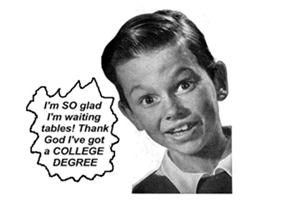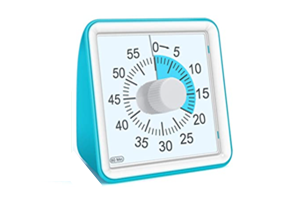Question
During my 9-year career I’ve read lots of books and articles about how to get a good job. My conclusion: Most of it is banal and useless. In all these years I’ve picked up just a handful of good tips that I use again and again. You’ve written several books about how to get a job. Impress me. Share some job hunting secrets from your books. Something I can use right now.
Nick’s Reply
 I’ve been saving your question as a good end-of-year topic. I agree with you that most advice about getting a job is recycled and misleading. It’s designed more to make life easier for employers, HR recruiters and headhunters than to help you.
I’ve been saving your question as a good end-of-year topic. I agree with you that most advice about getting a job is recycled and misleading. It’s designed more to make life easier for employers, HR recruiters and headhunters than to help you.
I’ll offer you four fundamental observations and suggestions that, in my experience, can make a material difference in a job hunter’s efforts to land a good job. These are taken directly from my PDF books (on which you’ll get a jolly 50% discount — scroll down). I think you’ll be able to use these ideas immediately and that they will make a material difference in your job search.
But first, why listen to me? It’s the old follow-the-money rule. As a headhunter who has worked on contingency most of my career, I get paid only when a client actually hires my job candidate. In contrast to an HR manager or recruiter, my methods have to work, or I don’t eat.
- Beat your competition even before the interview
- Show up with a business plan
- Address deliverables, not just questions
- Find the right headhunter
1. Beat your competition even before the interview
Once a job is posted online, your odds of winning it diminish to almost zero. The competition is huge. To boost your odds, you must get to the hiring manager through a powerful personal referral. Get in the door first, with a pre-emptive reference.
Your most powerful reference is the one who calls an employer before the employer calls him. A preemptive reference speaks up for you, not about you. Actually, this is not a reference at all, but a recommendation or a referral.
A preemptive reference thinks enough of you to pick up the phone to call the manager you want to work for, and recommends you. This is a big step beyond a reference; it’s a true professional courtesy. The best preemptive reference is when a reputable person in your field refers you to an employer. Who needs a résumé when you’ve got that? This is beyond even a professional courtesy; it’s an endorsement. It carries enormous weight.
This tip and other ways to gain an edge in today’s goofy job market are found in Fearless Job Hunting Book 3: Get in The Door (way ahead of your competition).
2. Show up with a business plan
To stand out from all the well-qualified competitors you face, don’t sit in an interview and answer questions. Show how you’ll do the job. This is especially important when you’re trying to change careers to something new,
Before you can legitimately ask for a job, you must assess the needs of a company and plan how you will contribute to its success. Don’t behave like a job applicant; behave like an employee. Show up ready to do the job in the interview. Bring a business plan showing how you will do the work and contribute to profitability.
By defining the work an employer needs done and showing how, exactly, you will apply your skills, you can demonstrate your value in the new work domain — your new career. While others show up asking for a job, your demonstration of how you will do the job actually helps the employer justify hiring you into a new field of work.
Of course, this isn’t easy. But nor is that great job you want! If you cannot pull this off when you meet the manager, you have no business in that interview.
This suggestion and the steps for pulling it off are in How Can I Change Careers? It’s not just for career changers.
JOLLY HOLIDAY DEAL!
Take 50% OFF your purchase of any Ask The Headhunter PDF books! A great gift for job-hunting friends!
Use discount code JOLLY50 at check-out. Limited time offer! Order now!
3. Address deliverables, not just questions
Here’s a little secret I learned long ago: Most managers stink at job interviews. While they ask a lot of questions, they rarely explain exactly what they really want and expect from a new hire.
This is why you’ll get no job offer — because you don’t know what the deliverables are for the job! So you must get the manager to say it.
How to Say It
“What are your objectives for your new hire? That is, what would you want me to accomplish after a week? What results would you want to see a month, three months, six months and after a year on the job? The more specific you can be, the better I can address the work you need done.”
Get answers to these questions, and you’ll know exactly what’s going to make the manager hire you. I’ve seen job interviews shift dramatically when the candidate helps the manager focus on deliverables. Suddenly, the manager understands that you’re there to talk shop — and that you are focused on the work!
This tip and others about how to help managers hire you are in Fearless Job Hunting Book 6, The Interview: Be The Profitable Hire.
4. Find the right headhunter. (There’s only one place to look.)
What most people don’t realize is that headhunters don’t find jobs for people. As independent consultants, we find the best workers for our client companies. It’s highly unlikely you’re going to be a candidate for a very specific assignment, so don’t waste your time seeking headhunters. We fill only about 3% of jobs.
If you’re going to seek out headhunters anyway, here’s how to do it right.
Pick out five or six companies you really want to work for: the shining lights in your industry, the places where your dream job resides. Call the office of the manager to whom you would report if you worked there. (Don’t be lazy. Do the necessary research. If you find your quarry you must be prepared to talk shop intelligently.) Introduce yourself briefly.
How to Say It
“I’m Mary Smith at Acme Widget Corporation. May I ask for your advice? I’m looking for the best headhunter in [marketing, finance, or whatever your specialty is]. I’ve always respected your company and I would value your suggestion. May I ask, What headhunter do you use and recommend to fill key positions in [marketing]?”This request is so unusual that it can be a very effective ice-breaker. Not every manager will provide a recommendation. (Some managers are very protective of their headhunters.) But some will.
Now you know who handles searches for the company you want to work in. When you contact the headhunter, the client’s name is almost guaranteed to get the headhunter’s attention — and to get your call returned.
This “secret” and advice about how to manage that headhunter once you’ve found them is reprinted from How to Work With Headhunters…and how to make headhunters work for you.
Does this really work?
Should you follow my advice? Long-time Ask The Headhunter subscriber Ray Stoddard puts it like this:
“The great news about your recommendations is that they work. The good news for those of us who use them is that few people are really willing to implement what you recommend, giving those of us who do an edge.”
I hope Ask The Headhunter helped you get an edge in 2021. The newsletter and the website will be on hiatus for two weeks while I take a vacation! See you with the next edition on January 11! Meanwhile, here’s wishing everyone a very Merry Christmas and Happy Holidays (no matter what you celebrate or where you celebrate it), and a Happy, Healthy, and Prosperous New Year!
: :




 I’m not a Human Resources expert or a lawyer. Because drug testing regulations vary by state in the U.S., you should check the law about what proper procedures are — and what your rights are. NOLO offers a good discussion about
I’m not a Human Resources expert or a lawyer. Because drug testing regulations vary by state in the U.S., you should check the law about what proper procedures are — and what your rights are. NOLO offers a good discussion about 
 It’s awkward and intimidating, isn’t it — getting a personal referral? This is a critical challenge in a job search. Once a person has identified a company where they’d like to work, how do they get a personal referral?
It’s awkward and intimidating, isn’t it — getting a personal referral? This is a critical challenge in a job search. Once a person has identified a company where they’d like to work, how do they get a personal referral?
 How you dress for a job interview in-person or online can have a big effect, though not just for the reasons you think. What you wear might help you dodge a bullet! But first let’s address the obvious: How to suss out the right way to dress.
How you dress for a job interview in-person or online can have a big effect, though not just for the reasons you think. What you wear might help you dodge a bullet! But first let’s address the obvious: How to suss out the right way to dress.
 We’ve discussed the
We’ve discussed the 
 In an economy where employers are struggling to find workers among millions in all the online databases, there’s a premium on automation. There are so many resumes, profiles and applications to sort through! When a task is as repetitive as reviewing job applications, especially when human time and effort are so expensive, it’s always better to let automation do the job. Isn’t it?
In an economy where employers are struggling to find workers among millions in all the online databases, there’s a premium on automation. There are so many resumes, profiles and applications to sort through! When a task is as repetitive as reviewing job applications, especially when human time and effort are so expensive, it’s always better to let automation do the job. Isn’t it?
 I’ve been following your company’s activities. I read the XXX article in YYY fish wrap weekly. I would like to learn more and I am contacting you because you were cited in the article.
I’ve been following your company’s activities. I read the XXX article in YYY fish wrap weekly. I would like to learn more and I am contacting you because you were cited in the article.
 I’m starting to plan next year’s editorial calendar for 2022. For almost 20 years, loads of newsletter subscribers and online readers have been sending me great questions every week. Keep ‘em coming!
I’m starting to plan next year’s editorial calendar for 2022. For almost 20 years, loads of newsletter subscribers and online readers have been sending me great questions every week. Keep ‘em coming!
 While employers demand to know all your salary information prior to an interview, they don’t disclose the salaries of jobs they post. They want you to apply blindly, hoping to snag you into rationalizing lower pay after you’ve invested hours filling out forms and interviewing. (This is the old
While employers demand to know all your salary information prior to an interview, they don’t disclose the salaries of jobs they post. They want you to apply blindly, hoping to snag you into rationalizing lower pay after you’ve invested hours filling out forms and interviewing. (This is the old 
 I like a manager that realizes it’s time to upend the recruiting, interviewing and hiring process. My compliments. (We covered your question about why it’s so difficult to fill jobs and hire people in
I like a manager that realizes it’s time to upend the recruiting, interviewing and hiring process. My compliments. (We covered your question about why it’s so difficult to fill jobs and hire people in